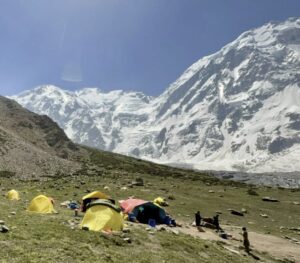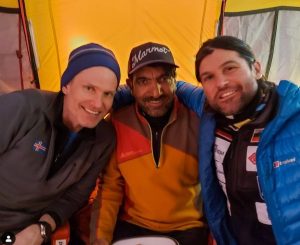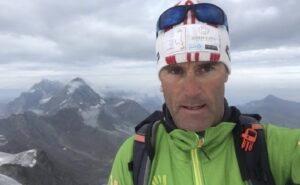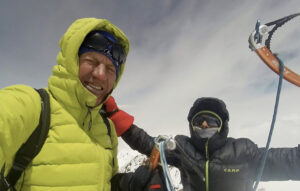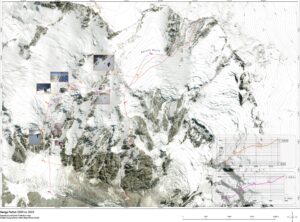After years of silence, the voices of Pakistani porters are reaching the public, and with this, the conscience of the entire expedition industry. The aftermath of the possibly avoidable death of Muhammad Hassan on K2, as dozens of climbers passed over him on their way to the summit, continues. Just this week, a long-awaited documentary aired in Austria and Germany on Servus TV.
Murtaza Ghulam Sadpara, rescued by Lukas Woerle on Broad Peak shortly before Hassan died on K2, has also spoken about how he was left behind on the mountain. He survived, barely, but several frostbitten fingers will have to be amputated, leaving his future ability to support his family in doubt.
Alone on Broad Peak’s summit ridge
Two weeks before Muhammad Hassan died on K2, Murtaza Sadpara narrowly escaped the same fate on Broad Peak. On July 17, we reported about an Austrian climber who had sacrificed his summit bid to help this abandoned porter.

Lukas Woerle’s IG story after he gave up his Broad Peak attempt to help Murtaza Ghulam Sadpara.
“On the summit ridge, I found a Pakistani HAP [high-altitude porter] lying in the snow,” Lukas Woerle told ExplorersWeb. “It was not possible to communicate properly with him, he was unable to remember his name, so I started dragging and pushing him back down.”
During their descent, Woerle was helped by an American climber and a Pakistani guide. The guide gave the sick porter one of the oxygen bottles he carried for clients, thereby saving his life.
Climber Stefan Fritsche also responded to Woerle’s SOS call. No one else on the mountain came.
The small coterie of rescuers gave him medicine and helped him back to Camp 3, where others took charge. That is just the beginning of Murtaza Gulam Sadpara’s story.

Lukas Woerle was also featured in the documentary, ‘Die Schande vom K2’ (The Shame of K2). Photo: Servus TV
‘Don’t cut off my fingers!’
Murtaza was taken to a hospital in Skardu with badly frostbitten fingers. He was penniless. El Correo states that Murtaza received an extra 50,000 rupees ($178) from the outfitter for medical treatment. But this was far from enough to have his frostbitten digits properly treated.
Doctors there said they could only amputate, but the 24-year-old father of two from the village of Sadpara refused. He needed his hands to work, he cried, and left the hospital.
Without proper treatment, his fingers soon turned black with necrosis. His fate didn’t look much brighter. Then his celebrated cousin, Sajid Sadpara, asked some friends for help. Sajid is the son of the late, great Ali Sadpara and a member of Murtaza’s family.
Sajid contacted a number of climbers. One of them, Alex Txikon of Spain, brought Murtaza to his hometown in Spanish Basque country for medical care. Earlier this week, Murtaza landed in Bilbao, where members of Txikon’s team and some journalists greeted him. He gave details about that day on Broad Peak.

Murtaza Sadpara’s fingers are beyond recovery. Photo: Alex Txikon via Javi Pozo/X
Wet gloves, frozen fingers
Murtaza was working with outfitter Blue Sky Tours on behalf of Mexican climbers Sebastian Arizpe and Max Alvarez. Alex Txikon told Barrabes.com that Murtaza’s salary was 50,000 rupees ($178). He also received a tip of 100,000 rupees ($357).
“He was carrying two bottles of oxygen for the clients, but he himself was climbing without gas, as he had none assigned for him by the agency, and he couldn’t afford to buy a mask and canister,” Fernando J. Perez of El Correo reported.
After 10 hours of climbing, they were at the summit ridge when bad weather forced the three of them to stop and wait for an hour. During that time, Murtaza’s poor-quality gloves soaked and froze his fingers.
“When the clients saw he couldn’t go on, they took the oxygen bottles and proceeded to the summit, leaving Murtaza behind,” Perez wrote. ExplorersWeb is trying to contact the Mexican climbers for their side of the story.

Sebastian Arizpe and Max Alvarez on the summit of Broad Peak. Photo: Vanguardia.mx
Rescuer Lukas Woerle has refused to point his finger at anyone. “I will not take part in blaming others in public,” he said recently. “Everyone has to live with their actions.”
Pakistan’s local government gave Woerle an award for his heroism. He also received a free climbing permit should he return to Broad Peak.
Solutions needed
Murtaza Sadpara’s case has shown again the conditions under which porters work and what befalls them if they become injured or sick. Rather than seek culprits — possibly the entire high-altitude tourism industry, including the media, share the blame — we need solutions.
Unfortunately, there is no solution for Murtaza’s fingers. No doctor in Spain or elsewhere can save them. He will have to find a way to provide for his family. (Check El Correo and Barrabes.com for information about fundraising initiatives).
Muhammad Hassan’s family secure
The shameful circumstances under which Muhammad Hassan died on K2 had an unexpectedly positive effect, at least for his family.
The photos of Philip Flaemig and the efforts of teammate Willhelm Steindl, plus their testimony to ExplorersWeb, made Hassan’s story viral. It shed a new light on some climbers and prompted an investigation by the Gilgit-Baltistan government.
It has also raised a remarkable amount of money for Hassan’s family via a GoFundMe program set up by Steindl. Some weeks ago, Steindl traveled to Shigar in Pakistan to transfer the money to the family. It will allow Hassan’s children to have a proper education. In collaboration with Austria’s embassy, he is also building a climbing school near Skardu.
During the visit, Steindl also had a chance to interview Muhammad Hassan’s cousin, also named Hassan, who stayed by his side until he died. It was the footage of this man rubbing Hassan’s chest that made Steindl and Flaemig realize that something serious had happened at the top of the Bottleneck when they checked their drone footage in Base Camp.

A drone image captured by Philip Flaemig shows Hassan and his cousin in the snow (upper left in the photo). Photo: Servus TV
ExplorersWeb had access to an English transcription of the interview. Hassan’s cousin insisted that the accident took place at about 11 pm, hours before earlier estimates. He described how Hassan had tried to climb back up several times until he gave up, exhausted.
When the “main members of the team” came around dawn, Hassan’s cousin said that three Nepalis tried to lift Hassan back up to the trail. They soon gave up because “they had no pulley.”
“Then came Gabriel [Tarso], who did have a pulley, and helped Hassan back to the trail,” the Pakistani recalled.
30 to 40 climbers ignored him
He estimates that 30 to 40 people passed by his stricken cousin and continued to the summit. Someone told him that Hassan was beyond help, but the Pakistani refused to leave his cousin until he died.
“Suddenly somebody hit my leg with his crampon and asked me to move up a little, and helped me move Hassan further up, off the trail,” the surviving porter said. Although keeping track of time was difficult, he estimates that Muhammad Hassan died between 10 and 11 am.
Hassan’s cousin also admitted that they both wanted to go further than Camp 3. Even if no one had promised them a summit bonus, they felt strong and able to go all the way to the top. He also described how Hassan fell when the ground (probably a snow slab) gave way under his feet.

Willi Steindl, in a black T-shirt, poses surrounded by Gilgit-Baltistan authorities and the military, with the banner of Skardu’s future climbing school.
Finally, like other porters, Hassan’s cousin asks for better conditions. Most of all, he wants to acquire proper climbing skills and to have suitable equipment for this sort of work. There is currently no way for young porters to learn from one another and gain experience.
Documentary aired this week
The porter’s testimony was added at the last minute to the documentary about K2 that Austria’s Servus TV had hired Philip Flaemig to film. Originally, it was a wider, less focused story, but producers eventually decided to narrow the plot to the events that took place on summit day.
They titled it Die Schande am K2 (“Shame on K2”). Willi Steindl was the central character, and it included comments from several K2 climbers that season, as well as from prestigious past veterans Gerlinde Kaltenbrunner and Hans Kammerlander.
The documentary also included an interview with Gabriel Tarso, recorded while he trekked back from K2 Base Camp back to Skardu with Steindl and Flaemig. Tarso recalls emotionally how he tried his best to help Hassan. During the interviews, neither Hassan’s cousin nor Tarso mentioned Kristin Harila.
We will never know if a coordinated rescue effort could have saved him. Several climbers consulted believe it may have. All agreed, however, that in future, no one must be left behind — neither porter nor client nor guide.
Muhammad Hassan only had his cousin for company in his last moments, and Murtaza’s soon-to-be amputated fingers will not grow back. Yet something is changing. Steps are being taken, thanks to both Pakistanis and foreign climbers, who are raising their voices and exposing a situation that can and must be improved.

The traverse under K2’s Great Serac. Photo: Philip Flaemig/Servus.tv

